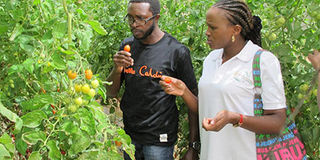I saw a gap in agritours; now I take farmers to top farms across the world

Caroline Gichuki with a farmer at a farm in Israel. PHOTO | MICHAEL ORIEDO
What you need to know:
- This was an agritour, thus, we balanced between leisure and learning. We visited two dairy farms where farmers learned different aspects of sheep and cow keeping.
- Any business worth its salt should return profits. My firm is about two years old; my focus currently is not money, but I want to grow the business. I want to expand the business and make Kenyans embrace agritourism locally and internationally.
- Last minute cancellations, which can ruin good plans and managing peoples’ expectations while on such trips, especially when we are balancing between leisure and learning.
CAROLINE GICHUKI-MUGO runs Techfarm (Kenya) Tours and Travel, an agri-tourism firm that recently organised a trip for over 40 farmers to Israel. She spoke to MICHAEL ORIEDO on why she chose this type of agribusiness and the stakes in it
Agritourism involves travel that has a farming component, which is educative to farmers. How did you get into this business?
I was working with a leisure tour firm when I chanced upon the idea while going through a magazine. I realised that agritourism was a big thing in Europe and thought, why not go into it? I planned my way out of the firm into my company.
So what is your typical day like?
Most of our work is done online, which means I spend a lot of time on the internet. I check out on bookings, see that relevant information on various trips we are organising are posted online for people to access them. I also follow up on visa, bookings and all the other aspects of the trip. My days are usually packed as I also organise work in the office. I have five employees.
Tell us about the Israeli trip
Through Techfarm, we were able to take 45 farmers to Israel to attend an agri-tech exhibition and visit several farms to learn technologies that can help them make their agribusinesses profitable. It took me over six months to successfully organise the trip.
I first started by reading a lot about Israel and the learning opportunities that are there for farmers. Once I was sure that there were many things farmers would learn, I looked at the costs involved and later searched for an Israeli partner to work with.
I settled on the partner after a thorough background search and told them (travel firm) of my expectations and those of my clients and agreed on a quorum, which was 30. I then started to market the trip.
I advertised in newspapers, radio and reached out to those I knew personally. More than half of the farmers who engaged us knew about the trip by word of mouth. It took me three to four months to get the quorum that I needed.
This was an international trip, thus, the farmers needed travel documents that include visas, insurance and air-tickets. I did everything for them to eliminate attendant bureaucracy issues. Besides, it was easier for the embassy to deal with one person than 40.
So how much does such a trip cost?
An average of Sh200,000. This caters for all the costs that include air-ticket, visa charges, accommodation, food and visits to various sites. One had to pay 50 per cent before we started the work.
Which places did you visit in Israel?
This was an agritour, thus, we balanced between leisure and learning. We visited two dairy farms where farmers learned different aspects of sheep and cow keeping.
We also visited fish, banana, wheat and dates farms, where farmers learned several technologies. Besides the farms, we toured several Biblical sites in Bethlehem and Jerusalem.
SHOW ME THE MONEY
Very interesting. Is there money in this venture?
Any business worth its salt should return profits. My firm is about two years old; my focus currently is not money, but I want to grow the business. I want to expand the business and make Kenyans embrace agritourism locally and internationally.
We also organise tours and seminars locally as there is a lot to be learnt from each other. I am now working on taking farmers to the Netherlands in September and Dubai in December.
What are the challenges in the business?
Last minute cancellations, which can ruin good plans and managing peoples’ expectations while on such trips, especially when we are balancing between leisure and learning.
One has also to be keen so that you do not end up being conned by the travel agent you are working with in the destination country. You have to work with the embassies. In Nairobi, you work with the embassy of the country where you are going and in that nation, the Kenyan embassy. It is part of due diligence.
Again, the business involves a lot of travelling, which means I have to balance between family life and work. I am married with two children.
You are also a farmer, tell us about that
I keep 200 layers, grow traditional vegetables and potatoes on half-an-acre in Nyahururu. You must be a farmer to understand and serve farmers better.




